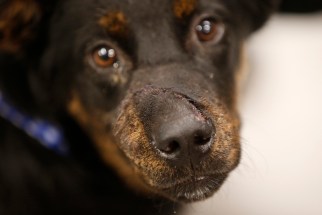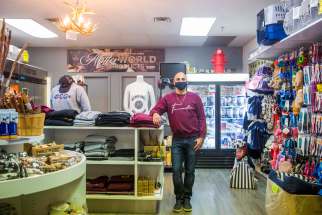Journey of healing Machete attack on dog highlights lack of animal welfare resources in remote communities, vets say
Read this article for free:
or
Already have an account? Log in here »
To continue reading, please subscribe:
Monthly Digital Subscription
$0 for the first 4 weeks*
- Enjoy unlimited reading on winnipegfreepress.com
- Read the E-Edition, our digital replica newspaper
- Access News Break, our award-winning app
- Play interactive puzzles
*No charge for 4 weeks then price increases to the regular rate of $19.00 plus GST every four weeks. Offer available to new and qualified returning subscribers only. Cancel any time.
Monthly Digital Subscription
$4.75/week*
- Enjoy unlimited reading on winnipegfreepress.com
- Read the E-Edition, our digital replica newspaper
- Access News Break, our award-winning app
- Play interactive puzzles
*Billed as $19 plus GST every four weeks. Cancel any time.
To continue reading, please subscribe:
Add Free Press access to your Brandon Sun subscription for only an additional
$1 for the first 4 weeks*
*Your next subscription payment will increase by $1.00 and you will be charged $16.99 plus GST for four weeks. After four weeks, your payment will increase to $23.99 plus GST every four weeks.
Read unlimited articles for free today:
or
Already have an account? Log in here »
Hey there, time traveller!
This article was published 21/10/2020 (1873 days ago), so information in it may no longer be current.
What struck Tim Kraemer was how, even as the puppy lay in a kennel, nose splayed open and partly dangling off after someone had hacked it with a machete, the dog still accepted belly rubs with a wagging tail.
Hours later, the eight-month-old puppy, one of three dogs recently attacked in a remote Manitoba community, was on the road to recovery in Winnipeg. Kraemer and Grant Park Animal Hospital colleague Jonas Watson had reconstructed its muzzle in a nearly two-hour surgery Tuesday.
Now, the veterinarians hope Zed’s story will shine a light on the need for action in rural and remote parts of Manitoba to address the broad conditions that leave animals vulnerable and the lack of sufficient access to veterinary care.
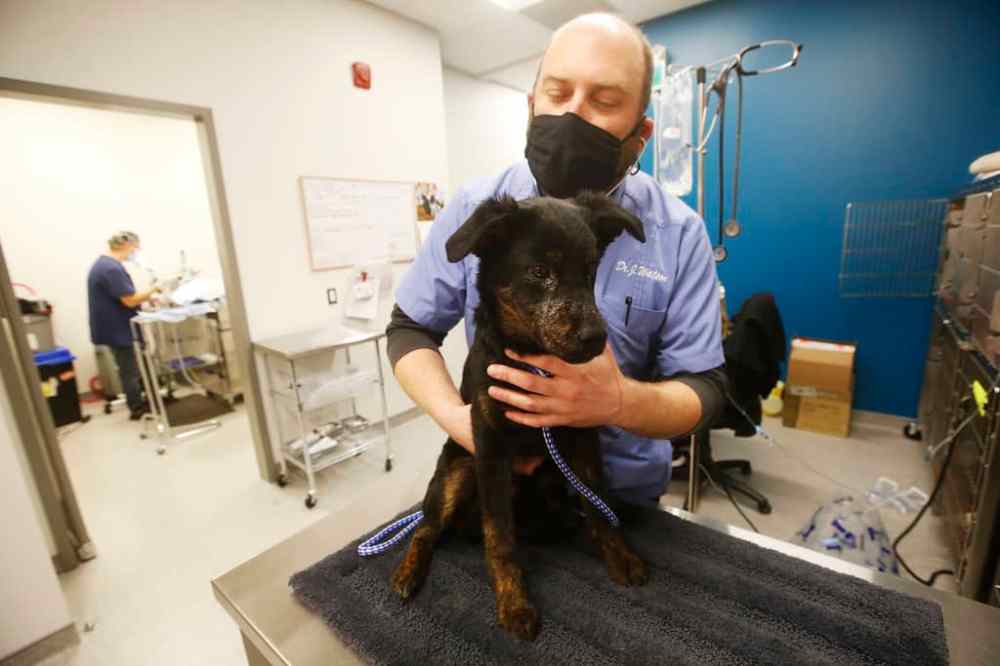
“There needs to be greater attention paid to companion animal welfare in remote parts of the province, otherwise devastating stories like these will continue to happen,” Watson says in the surgery room of the Taylor Avenue clinic Wednesday afternoon.
“It’s great when we can help them and make a difference, but it is frustrating when very little in terms of policy making is happening to make a difference for these animals.”
Zed’s journey began last week, when a family brought the puppy to a nursing station in their community, desperate for help. Their friendly young dog had been attacked by someone wielding a machete; the blade had bit through the upper part of the muzzle, slashing it open down to the roof of the mouth.
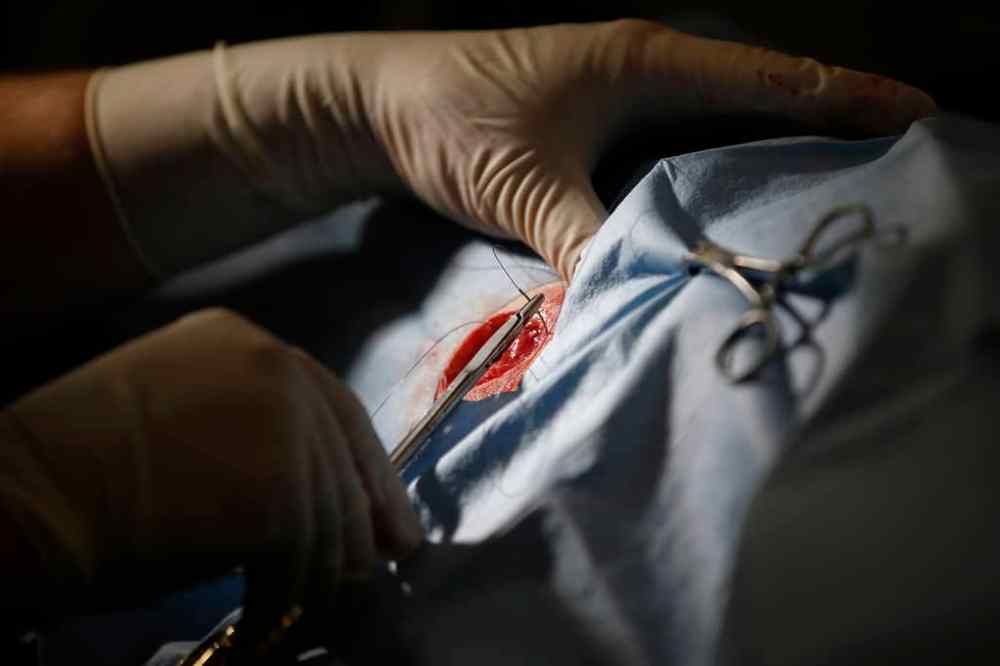
With nurses unable to help a canine, the family turned to Katie Powell of Save a Dog Network Canada, a Winnipeg-based non-profit which helps link remote communities with veterinary services. In a Facebook post Monday, Powell called the injury “the most horrific case of intentional animal abuse we have ever seen.”
Powell sent photos of Zed’s wounds to Watson, who believed he and his colleagues could help. The male puppy was transported to Winnipeg, where he was triaged at an emergency veterinarian overnight before being taken to the animal hospital for evaluation and surgery.
By then, the wound was about 10 days old, clogged with rotting bone and dead tissue. Watson says he had never seen an injury quite like it in his career.
At first, it wasn’t clear how well they would be able to put the pieces of the sinuses back together. “As soon as I got a chance to look at it, and I saw that it still had a nose intact but just flopped off to the side, I realized that I thought that (Watson) and I could fix that dog,” Kraemer says. “I really did.”
“It’s great when we can help them and make a difference, but it is frustrating when very little in terms of policy making is happening to make a difference for these animals.”
– Jonas Watson
The surgery was a success. Other than swelling and a narrow suture line that winds through the brown fur, it wasn’t obvious there had been a major wound at all.
“It was kind of uncanny how well some of the pieces fit back together with just a little bit of suturing,” Watson says.
The attack has been reported to RCMP in the community, which the Free Press agreed not to identify. A second dog that suffered a deep laceration to its side has also been transported to the city, where it will be transferred Thursday to the Winnipeg Humane Society.
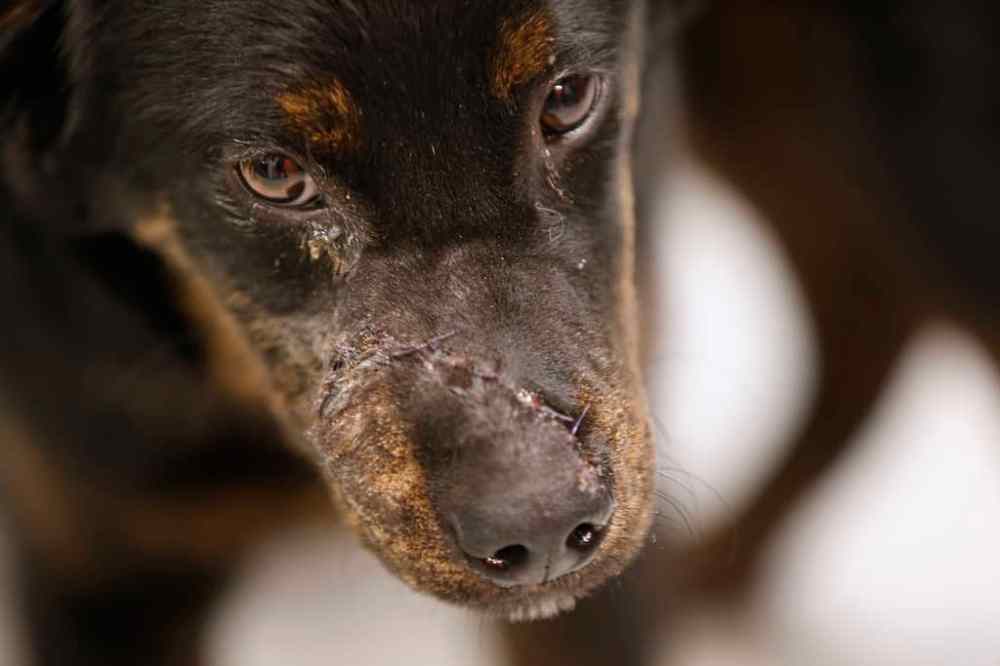
What Zed’s case highlights, Watson says, is how the ongoing lack of access to companion animal welfare, as well as lack of supports for human wellness (such as mental health care), can help exacerbate situations in which animals are at risk.
“Isolated Manitoba communities need easy access to veterinary care so that an injury like this doesn’t have to wait 10 days before it’s seen,” Watson says. “They also need easy access to spays, neuters and vaccinations, so that dogs aren’t roaming around interacting with people that aren’t their owners and getting into trouble.
“There are governments and decision makers in high places that could act more affirmatively on this problem, had they the will to do so,” he says. “I believe greater efforts need to be made here, otherwise it’s going to continue year after year. It’s getting frustrating, and heartbreaking.”
Powell, who helped arrange Zed’s transportation and care, concurs.
“This dog was very loved. His family is devastated. This is about lack of veterinary care in northern Manitoba… and why we are fighting so hard for these dogs.”
– Katie Powell of Save a Dog Network Canada
“This dog was very loved. His family is devastated,” she says. “This is about lack of veterinary care in northern Manitoba… and why we are fighting so hard for these dogs.”
For this pup, at least, a happy ending. By Wednesday morning, Zed had recovered so well from surgery he was joyfully rolling in the fresh snow outside the clinic and eagerly taking treats from visitors’ hands.
After he is healed, he will be transferred for adoption at Precious Paws rescue in Toronto, which helped fundraise for his care.
For the veterinarians, to see the puppy springing back so brightly from such a serious injury makes it all worth it.
“It melted my insides,” Kraemer says. “Finding out he was outside and playing in the snow today just brought some joy to my heart.”
melissa.martin@freepress.mb.ca
Our newsroom depends on a growing audience of readers to power our journalism. If you are not a paid reader, please consider becoming a subscriber.
Our newsroom depends on its audience of readers to power our journalism. Thank you for your support.





